June 04
Massachusetts becomes the first state to establish a minimum wage – 1912
The House of Representatives approves the Taft-Hartley Act. The legislation allows the president of the United States to intervene in labor disputes. President Truman vetoed the law but was overridden by Congress – 1947
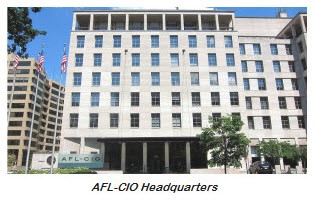 The AFL-CIO opens its new headquarters building, in view of the White House – 1956
The AFL-CIO opens its new headquarters building, in view of the White House – 1956
Gov. Jerry Brown signs the California Agricultural Labor Relations Act, the first law in the U.S. giving farmworkers collective bargaining rights. The legislation came after years of effort by the United Farm Workers union – 1975
June 05
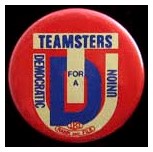 Thirty-five members of the Teamsters, concerned about the infiltration of organized crime in the union and other issues, meet in Cleveland to form Teamsters for a Democratic Union – 1976
Thirty-five members of the Teamsters, concerned about the infiltration of organized crime in the union and other issues, meet in Cleveland to form Teamsters for a Democratic Union – 1976
A strike begins at a General Motors Corp. parts factory in Flint, Mich., that spreads and ultimately forces the closure of GM plants across the country for seven weeks. The Flint workers were protesting the removal of key dies from their plant and feared their jobs would be lost. The company ended the dispute by assuring the plant would remain open until at least the year 2000 – 1998
June 06
The U.S. Employment Service was created – 1933
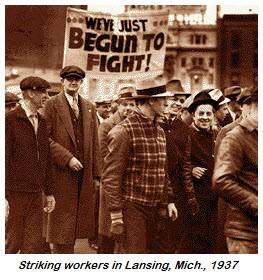 A general strike by some 12,000 autoworkers and others in Lansing, Mich., shuts down the city for a month in what was to become known as the city’s “Labor Holiday.” The strike was precipitated by the arrest of nine workers, including the wife of the auto workers local union president: The arrest left three children in the couple’s home unattended – 1937
A general strike by some 12,000 autoworkers and others in Lansing, Mich., shuts down the city for a month in what was to become known as the city’s “Labor Holiday.” The strike was precipitated by the arrest of nine workers, including the wife of the auto workers local union president: The arrest left three children in the couple’s home unattended – 1937
U.S. President Harry S. Truman and American Federation of Musicians President James Petrillo perform a piano duet at the union’s convention in Asbury Park, N.J. – 1948
Labor Party founding convention opens in Cleveland, Ohio – 1996
June 07
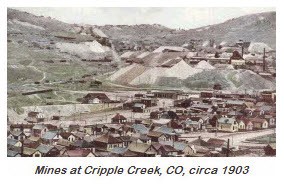 Militia sent to Cripple Creek, Colo., to suppress Western Federation of Miners strike – 1904
Militia sent to Cripple Creek, Colo., to suppress Western Federation of Miners strike – 1904
Sole performance of Pageant of the Paterson (N.J.) Strike, created and performed by 1,000 mill workers from the silk industry strike, New York City – 1913
Striking textile workers battle police in Gastonia, N.C. Police Chief O.F. Aderholt is accidentally killed by one of his own officers. Six strike leaders are convicted of “conspiracy to murder” and are sentenced to jail for from five to 20 years – 1929
Founding convention of the United Food and Commercial Workers. The merger brought together the Retail Clerks Int’l Union and the Amalgamated Meatcutters and Butcher Workmen of North America – 1979
The United Steelworkers and the Sierra Club announce the formation of a strategic alliance to pursue a joint public policy agenda under the banner of Good Jobs, A Clean Environment, and A Safer World – 2006
June 08
The earliest recorded strike by Chinese immigrants to the U.S. occurred when stonemasons, who were brought to San Francisco to build the three-story Parrott granite building—made from Chinese prefabricated blocks—struck for higher pay – 1852
A battle between the Militia and striking miners at Dunnville, Colo., ended with six union members dead and 15 taken prisoner. Seventy-nine of the strikers were deported to Kansas two days later – 1904
Spectator mine disaster kills 168, Butte, Mont. – 1917
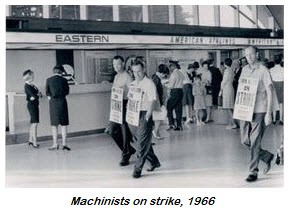 Some 35,000 members of the Machinists union begin what is to become a 43-day strike—the largest in airline history—against five carriers. The mechanics and other ground service workerswanted to share in the airlines’ substantial profits – 1966
Some 35,000 members of the Machinists union begin what is to become a 43-day strike—the largest in airline history—against five carriers. The mechanics and other ground service workerswanted to share in the airlines’ substantial profits – 1966
New York City drawbridge tenders, in a dispute with the state over pension issues, leave a dozen bridges open, snarling traffic in what the Daily News described as “the biggest traffic snafu in the city’s history” – 1971
June 09
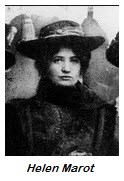 Helen Marot is born in Philadelphia to a wealthy family. She went on to organize the Bookkeepers, Stenographers and Accountants Union in New York, and to organize and lead the city’s 1909-1910 Shirtwaist Strike. In 1912, she was a member of a commission investigating the Triangle Shirtwaist Factory fire – 1865
Helen Marot is born in Philadelphia to a wealthy family. She went on to organize the Bookkeepers, Stenographers and Accountants Union in New York, and to organize and lead the city’s 1909-1910 Shirtwaist Strike. In 1912, she was a member of a commission investigating the Triangle Shirtwaist Factory fire – 1865
June 10
Unions legalized in Canada – 1872
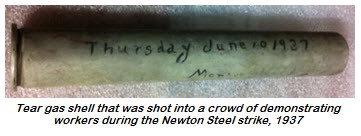 The mayor of Monroe, Mich. organizes a vigilante mob of 1,400 armed with baseball bats and teargas to break the organizing picket line of 200 striking workers at Newton Steel. The line is broken; eight are injured and hospitalized. Sixteen workers’ cars were vandalized, five cars overturned, and eight more were dumped into the River Raisin – 1937
The mayor of Monroe, Mich. organizes a vigilante mob of 1,400 armed with baseball bats and teargas to break the organizing picket line of 200 striking workers at Newton Steel. The line is broken; eight are injured and hospitalized. Sixteen workers’ cars were vandalized, five cars overturned, and eight more were dumped into the River Raisin – 1937
U.S. Supreme Court rules in Anderson v. Mt. Clemens Pottery Co. that preliminary work activities, where controlled by the employer and performed entirely for the employer’s benefit, are properly included as working time. The decision is known as the “portal to portal case” – 1946
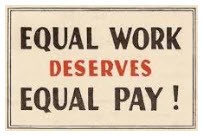 President Kennedy signs a law mandating equal pay to women who are performing the same jobs as men (Equal Pay Act) – 1963
President Kennedy signs a law mandating equal pay to women who are performing the same jobs as men (Equal Pay Act) – 1963
– Compiled and edited by David Prosten.
